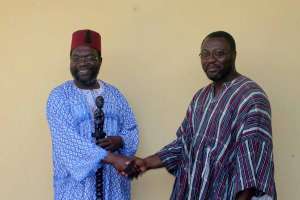 I have been involved in strategic planning for Bible translation on and off for years. The process is straightforward. One of the steps is to gather information such as the opportunities and challenges in the environment. For example, one of the challenges facing Bible translation in Africa is the high numbers of people who can’t read. A fact like that must have a response in the strategic plan; such as a literacy program, doing audio recordings, or both.
I have been involved in strategic planning for Bible translation on and off for years. The process is straightforward. One of the steps is to gather information such as the opportunities and challenges in the environment. For example, one of the challenges facing Bible translation in Africa is the high numbers of people who can’t read. A fact like that must have a response in the strategic plan; such as a literacy program, doing audio recordings, or both.
So in theory, a strategic plan is built on information. But often, some information is missing. There might not be a reliable source for the information, or different sources might give quite different information for the same item. So the bedrock of strategic planning – good information – is missing.
But we still have to make a decision, we are here to do something, so we must act with or without information. (Going forward without a plan actually means that you are going forward with an implicit plan – one you haven’t thought about, examined, prayed over or subjected to the scrutiny of others.)
There are several ways forward in this situation:
- Make getting the needed information, a priority item in the strategic plan.
- Make sure that the plan follows God’s character, is just and fair, and reflects God’s action and mission in the world.
- Check the plan against self-interest.

Strategic planning in Congo in 2003
Even committed missionaries or nationals can make a plan that is in their personal interest. For example, they might adopt a plan because it is likely to cost them less money, attract funding, or because it has the kinds of activities they prefer.
You might have noticed that we need to do the last two items in the list even if we have information. That is true, but solid information tends to marginalize self-interest, making it more difficult to surface. Say we have information that the people for whom we are translating have high numbers of people who can’t read.

Planning for the komo language in Congo, 2003
When that fact is on the table for everyone to see and discuss, that makes it harder for someone who find literacy unappealing say that literacy is not needed. It can still happen, of course. But in the absence of information about literacy, team members who find literacy unappealing can consciously or unconsciously write a plan with little or no literacy. I use literacy as an example. The problem can be in an area.
In planning, lack of information can present an opportunity to test our commitment to working in ways that help others however that affects us. It may seem odd to see that kind of challenge can crop up in strategic planning, but in my experience the strategic planning process is almost always an opportunity for spiritual growth.


 I have been involved in strategic planning for Bible translation on and off for years. The process is straightforward. One of the steps is to gather information such as the opportunities and challenges in the environment. For example, one of the challenges facing Bible translation in Africa is the high numbers of people who can’t read. A fact like that must have a response in the strategic plan; such as a literacy program, doing audio recordings, or both.
I have been involved in strategic planning for Bible translation on and off for years. The process is straightforward. One of the steps is to gather information such as the opportunities and challenges in the environment. For example, one of the challenges facing Bible translation in Africa is the high numbers of people who can’t read. A fact like that must have a response in the strategic plan; such as a literacy program, doing audio recordings, or both.

 Hearts and minds can only be touched through language, specifically the language that goes deep into their hearts and minds – the heart language or mother tongue.
Hearts and minds can only be touched through language, specifically the language that goes deep into their hearts and minds – the heart language or mother tongue. Choirs in African churches often differ from choirs in the US. For one thing, they often function as small groups for Bible study and mutual support. But the aspects I want to focus on today is that they often sing in African languages and they very often write their own songs, sometimes regularly introducing new songs. Coupled with high rates of illiteracy found in many parts of rural Africa, choirs can be an important way to get the Bible to people.
Choirs in African churches often differ from choirs in the US. For one thing, they often function as small groups for Bible study and mutual support. But the aspects I want to focus on today is that they often sing in African languages and they very often write their own songs, sometimes regularly introducing new songs. Coupled with high rates of illiteracy found in many parts of rural Africa, choirs can be an important way to get the Bible to people. In all the churches, the availability of the Bible or New Testament is a source of inspiration for composers of Christian songs in their mother tongues. Whereas the first missionaries translated their English or French hymns into Malian languages, Malian Christians composed their own hymns using their musical styles. The songs composed by Christians who do not read the bible are full of moral exhortations which differ only from the songs of non-Christians because the name of Jesus appears a few times. On the other hand, composers who read the Bible are a minority, but they write songs enriched by the Word of God.
In all the churches, the availability of the Bible or New Testament is a source of inspiration for composers of Christian songs in their mother tongues. Whereas the first missionaries translated their English or French hymns into Malian languages, Malian Christians composed their own hymns using their musical styles. The songs composed by Christians who do not read the bible are full of moral exhortations which differ only from the songs of non-Christians because the name of Jesus appears a few times. On the other hand, composers who read the Bible are a minority, but they write songs enriched by the Word of God. This is another example of how the translation of the Bible into the language of the people enhances faith and people’s experience of church.
This is another example of how the translation of the Bible into the language of the people enhances faith and people’s experience of church. As they sing these songs, and often the congregation sings along, the Bible will get into the heads of people who may never learn to read. That’s important because of high rates of illiteracy in Africa, especially in rural Africa.
As they sing these songs, and often the congregation sings along, the Bible will get into the heads of people who may never learn to read. That’s important because of high rates of illiteracy in Africa, especially in rural Africa.